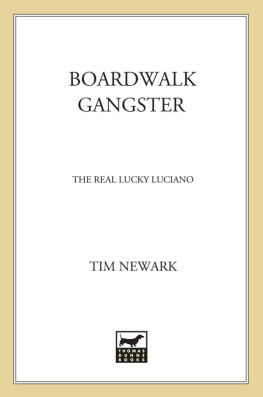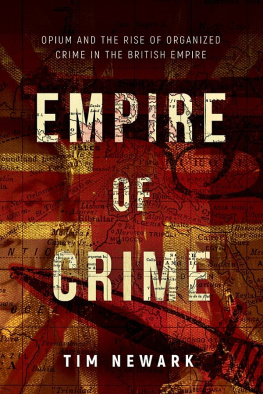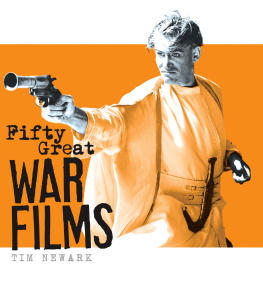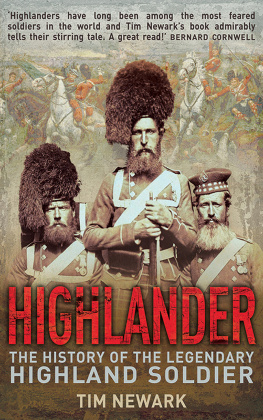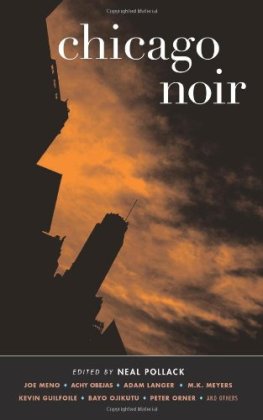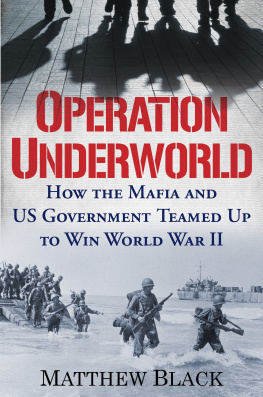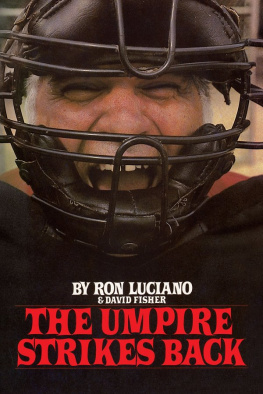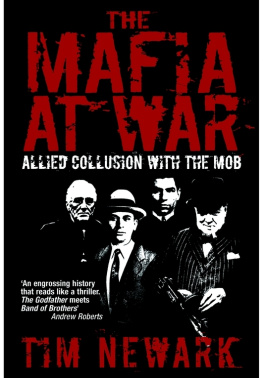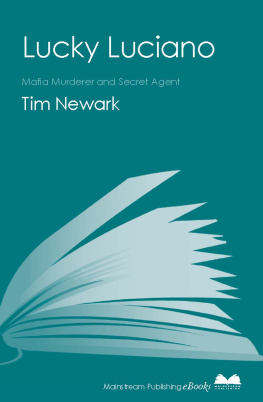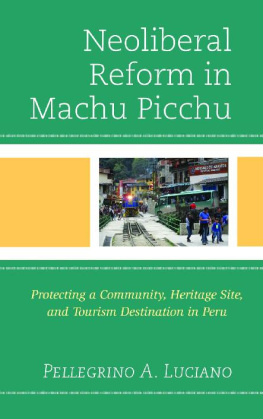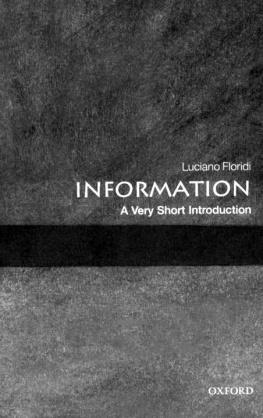About the Auhtor
Tim Newark is the author of the critically acclaimed Mafia Allies. He is editor of Military Illustrated, the leading military history monthly magazine, and has written numerous military history volumes, including Highlander. He has worked as a TV scriptwriter and historical consultant, resulting in seven documentary series for BBC Worldwide and the History Channel, including the thirteen-part series Hitlers Bodyguard. He contributes book reviews to the Financial Times, Time Out and the Daily Telegraph.
LUCKY LUCIANOMAFIA MURDERER AND SECRET AGENTTim Newark
This eBook is copyright material and must not be copied, reproduced, transferred, distributed, leased, licenced or publicly performed or used in any way except as specifically permitted in writing by the publishers, as allowed under the terms and conditions under which it was purchased or as strictly permitted by applicable copyright law. Any unauthorised distribution or use of this text may be a direct infringement of the authors and publishers rights and those responsible may be liable in law accordingly.
Epub ISBN: 9781907195976
Version 1.0
www.mainstreampublishing.com
Copyright Tim Newark, 2010
All rights reserved
The moral right of the author has been asserted
First published in USA in 2010 by
Thomas Dunne Books, St Martins Press,
175 Fifth Avenue, New York, N.Y. 10010
This edition first published in Great Britain in 2010 by
MAINSTREAM PUBLISHING COMPANY
(EDINBURGH) LTD
7 Albany Street
Edinburgh EH1 3UG
ISBN 9781845967376
No part of this book may be reproduced or transmitted in any form or by any other means without permission in writing from the publisher, except by a reviewer who wishes to quote brief passages in connection with a review written for insertion in a magazine, newspaper or broadcast
A catalogue record for this book is available from the British Library
1 3 5 7 9 10 8 6 4 2
To Peter, my father, who first took me to New York City
Introduction
F or the first 25 years of his criminal career, Charles Lucky Luciano was a vicious mobster who rose to become the multimillionaire king of the New York underworld. For the next 25 years of his life, Luciano was a legend but a fake master criminal without real power, his evil reputation manipulated and maintained by the government agents who put him behind bars.
Drawing on once-secret government documents from archives in America and Europe, I have sought to tell the true story of the legendary gangster from his early days as a top hit man for the mob to his exploits running sex and narcotics empires. I reveal for the first time Lucianos transatlantic trip to Weimar Germany to set up a drug-importing racket. When Luciano went to jail, his reputation was only enhanced when rumours emerged about him helping the Allies to win World War II. By cross-referencing military reports in America with personal accounts in Sicily, I have exposed the truth about what Luciano really did to assist the Allies in the war.
With his expulsion from the US, Luciano returned to Italy where he became the arch-villain for international law-enforcement agencies. He was reputed to head a massive transatlantic narcotics network, but, in truth, Luciano was being used by government agents to justify their own bloated law-enforcement budgets. It was a complex conspiracy in which Luciano the fake master criminal became the victim of far bigger powers around him. There is even some evidence that, at one time, he was working as a Cold War agent, helping the US government fight Communism in Sicily. It is an extraordinary story that has never been fully told before, but first one must deal with the issue of the most notorious book written about the gangster.
Richard Hammer was a slim, fit 80 year old when I met him for lunch at the Atlantic Grill on Third Avenue on New York Citys Upper East Side. He used to run every day, but now he just cycles. Hammer is the co-author of the controversial bestseller The Last Testament of Lucky Luciano, first published in 1975. It is a dramatic account of the mobsters life told supposedly through his own words as he looked back over a life of crime. An exciting page-turner, it has been constantly dogged with criticism from those who believe it is bogus. Journalist Tony Scaduto unleashed a scathing 12-page attack on it in his 1976 biography of Luciano, calling it fraudulent and a complete fantasy, picking it apart error by error. So, how do you get to the truth behind the book? How do you ask an author whether he made it all up?
After speaking to Hammer on the phone and talking to publishers who had chatted with him, I got the feeling that he was understandably rather irritated by the decades-old fuss about the book. It is just one of more than twenty books he has written and it is certainly not the one he is most proud of. A literature graduate, he wrote an award-nominated account of the My Lai Massacre in Vietnam and was a brilliant young writer for the New York Times before he was asked to take on the Luciano project.
Self-styled film producer Martin Gosch had met Luciano while he was in exile in Italy in 1961. He had helped the mobster write a screenplay based on his life. Luciano was fed up with all the lies written about him and wanted to tell it as he wanted it told. But just as they were looking forward to casting the actor to play Luciano, they got word from New York that Lucianos Mafia associates were not happy with the idea of a movie about them. His long-time criminal partner Meyer Lansky was behind the threats and Luciano took them very seriously. He told Gosch that the movie was off otherwise theyd both be dead.
Instead, Luciano asked Gosch to take down his life story. He wanted the truth to get out somehow, but only on the condition that it would be published ten years after he died so as not to upset any of his gangster friends. Over the next few months, Gosch took down the memories of the mafioso. Just ten months later, Luciano was dead, struck down by a heart attack as he waited for Gosch at Naples Airport. There is no doubting that Gosch knew Luciano and heard many stories from his lips, but how true is the account that eventually appeared as The Last Testament over a decade later? No one could check with Gosch because he died in 1973, 15 months before the book was published.
We had arguments about the book all the time, recalled Hammer, then in his mid-40s. He thought he was a great writer.
At one stage, it was believed that the memoirs were dictated to a tape recorder.
There were never any tapes, says Hammer. It was the early 60s and tape recorders were big things. Martin talked to Luciano and took lots of notes. It was this pile of notes that he handed to me and I would check things over with him.
Through the course of his professional writing, Hammer has dealt with many gangsters over the years, but as he transcribed the notes, he developed a certain respect for the chief mobster.
Most gangsters are stupid Luciano was a great businessman. He was the most significant organised-crime figure of his period along with Lansky.
Luciano was, however, a relentless liar. On trial in 1936, he lied from the beginning to the end of his testimony, most outrageously saying he was born in New York when almost everyone knew he came from Sicily. Studying The Last Testament as an historical document, there are many occasions when what is supposedly the truth coming from Luciano is clearly not true and is contradicted by recorded facts and other accounts. One of the most glaring errors is his story of when he was kidnapped in 1929 in Manhattan and then dumped in a field in Staten Island after having been severely beaten. In the book, he describes being strung up by the wrists from a wooden beam and tortured by henchmen of Salvatore Maranzano, who wanted to force him to kill another Mafia boss. It is like a scene out of a gangster B-movie and may well have come from the original screenplay. It certainly has nothing to do with what really happened as recalled by Luciano in more reliable accounts.


